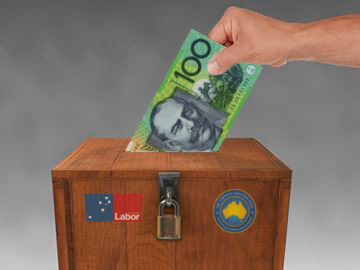Queensland rejigs vote money
 New Queensland electoral reforms will see public funding to candidates almost double after elections.
New Queensland electoral reforms will see public funding to candidates almost double after elections.
Queensland Premier Annastacia Palaszczuk has announced sweeping changes that will see payments to those standing for election increase from $1.57 per vote received to $3.
Political parties will have their payouts increased from $3.14 to $6 per vote received.
The eligibility threshold for payments has been lowered, so that parties and candidates need only 4 per cent of the primary vote, rather than 6 per cent, to receive the money.
There are also new donation caps and expenditure limits, leaving Queensland with some of the toughest political donation laws in the country.
Individual donors can now only give up to $10,000 over any parliamentary term, including a cap of up to $6,000 to one or several candidates of the same party and up to $4,000 to any single party.
Endorsed candidates can spend a maximum of $58,000 at election time and independent candidates up to $87,000.
Political parties can spend up to $92,000 per endorsed candidate for every electorate contested.
No more than $92,000 can be spent in any electorate, so parties cannot spend their entire cap in three or four seats.
“Big donations are gone, they will be no more,” the premier said.
“My Government has answered the calls to make elections more decent and equitable.
“This allows the way for other jurisdictions to follow. It stops big donations.”
The changes will be in place before the 2020 Queensland state election.
There are also new restrictions for third parties such as lobbies, advocacy groups and peak bodies, capping their spending at $87,000 in any single electorate with an overall cap of $1 million.
Donors can give a maximum of $4,000 to up to six third parties over four years.
Victoria has donation caps, but it does not currently impose expenditure limits, and New South Wales has a combination of the two, but Ms Palaszczuk says Queensland’s thresholds will be the most stringent.
Ms Palaszczuk said “pay for access” meetings and lunches should be curbed.
“The days of the $10,000 and $5,000-a-head conferences are gone,” she said.
“This is about making sure there is integrity in our electoral system, that there is a level playing field.”
Deputy Opposition Leader Tim Mander called the measures “unfair to any party other than to the Labor party”.
“While there's a $92,000 limit, that's per entity — so the 26 trade unions can spend $92,000 each on each of these electorates,” he said.
“The unions could spend up to $1 million each. These laws have been brought in to nobble the Opposition.”








 Print
Print